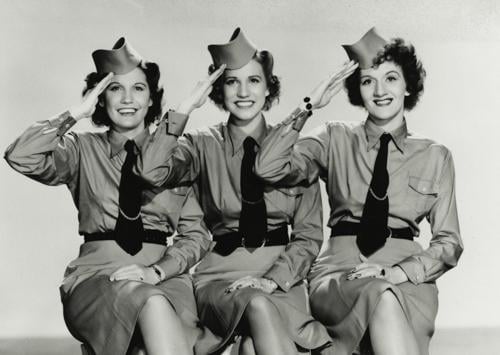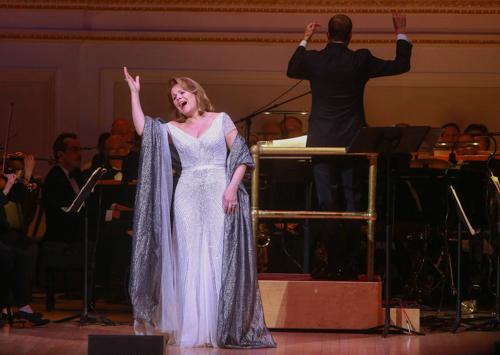Listen to New Voices on Studs Terkel our partnership with 826CHI-here! Read the Story
-
Thom Bishop discusses the musical revue "Suburbs of Heaven"
Feb. 7, 1979 Interviewing the cast of the musical revue "Suburbs of Heaven," songwriter Thom Bishop, singers Marty Peifer and Megon McDonough. Songs include "Mr. Arthur's Place," "Why Not Talk to Me?" "The Telephone Song," "Just Because You Didn't See Me," "Suburbs of Heaven," "Times I Tried to Love You," "Amateur Night/New Year's Eve," and "Somebody Feels the Water."
-
Terkel interviews Maxene Andrews of The Andrews Sisters
Aug. 23, 1982 Maxene Andrews reminisces over Andrews Sisters songs with Studs Terkel. She acknowledges the heavy influence the Boswell Sisters played in the creation of their image. She relays musical stories surrounding songs in Abbott and Costello such as "Bugle Boy" from their movie "Buck Privates". How they found the song "Mir Bist Du Schon" and Sammy Cahn and Saul Chaplin helped with the lyrics. How song pluggers brought The Andrews Sisters "Tip-Pi-Tin". How "Apple Blossom Time" helped an injured soldier at Oak Knoll Hospital upon his return to the states.
-
Studs Terkel discusses the WPA Arts Project
Sep. 14, 1989 The influence of the WPA on the music of the 1930's. The heroic sounds heard in song, movies, and theater. He provides Bing Crosby's version of Yip Harburg's "Brother Can You Spare a Dime". As well as the Almanac Singers performing "Roll the Union On". Both Moll's Song and the final scene of Blitzstein's, "The Cradle Will Rock" are performed. Terkel provides a host of other songs which highlight the music of the 1930's. Extensive discussion on "The Cradle Will Rock" with its producer John Houseman.
-
Studs Terkel comments and presents the Sophiatown Church of Christ the King ; part 3
1963 Presenting performances at the Sophiatown Church of Christ the King while Studs was in South Africa. They talked how they brought folk music back to South Africa.
-
Studs Terkel comments and presents the Sophiatown Church of Christ the King ; part 2
1963 Presenting performances at the Sophiatown Church of Christ the King while Studs was in South Africa. They talked how they brought folk music back to South Africa.
-
Studs Terkel comments and presents the Sophiatown Church of Christ the King ; part 1
1963 Presenting performances at the Sophiatown Church of Christ the King while Studs was in South Africa. They talked how they brought folk music back to South Africa.
-
Shay Duffin discusses his performances of Mr. Dooley and Brendan Behan
May. 25, 1988 Shay Duffin discusses and performs excerpts from his one-man play, “According to Mr. Dooley.” Duffin chronicles some background about Mr. Dooley and Brendan Behan and discusses how he found himself interested in portraying these characters. Includes a test tone lasting about 30 seconds that is part of the archival record as a representation of how broadcasters prepped their tape. Content Warning: This conversation includes racially and/or culturally derogatory language and/or negative depictions of Black and Indigenous people of color, women, and LGBTQI+ individuals.
-
Rita Streich discusses her upcoming recital and Studs plays selections ; part 3
Feb. 17, 1962 Studs Terkel interviews Rita Streich about her recital coming up. He also plays selections from her work for viewers to listen to. She also talks about music during World War II.
-
Renee Fleming discusses her opera career
Feb. 12, 1996 Renee Fleming discusses her musical upbringing, her repertoire, her relationship to performance, and more.
-
Presenting music with pianist and composer Larry Schanker
May. 30, 1991 Musical performance by Larry Schanker
-
Presenting music with actress and cabaret singer Andrea Marcovicci
May. 10, 1993 Terkel comments and presents a musical performance by Andrea Marcovicci
-
Presenting music from "Fancy Meeting You: The Lyrics of E.Y. "Yip" Harburg," with Phillip Officer and Tex Arnold
May. 6, 1997 Terkel comments and presents music from "Fancy Meeting You."
-
Presenting a musical performance by folksinger and songwriter Jim Post. Program includes an excerpt of a 1975 recording of Post and folk musician Win Stracke
Feb. 8, 1993 Terkel comments and presents a musical performance by Jim Post
-
Presenting a musical performance by folksinger and songwriter Jim Post
Jul. 7, 1985 Terkel comments and presents a musical performance by Jim Post





